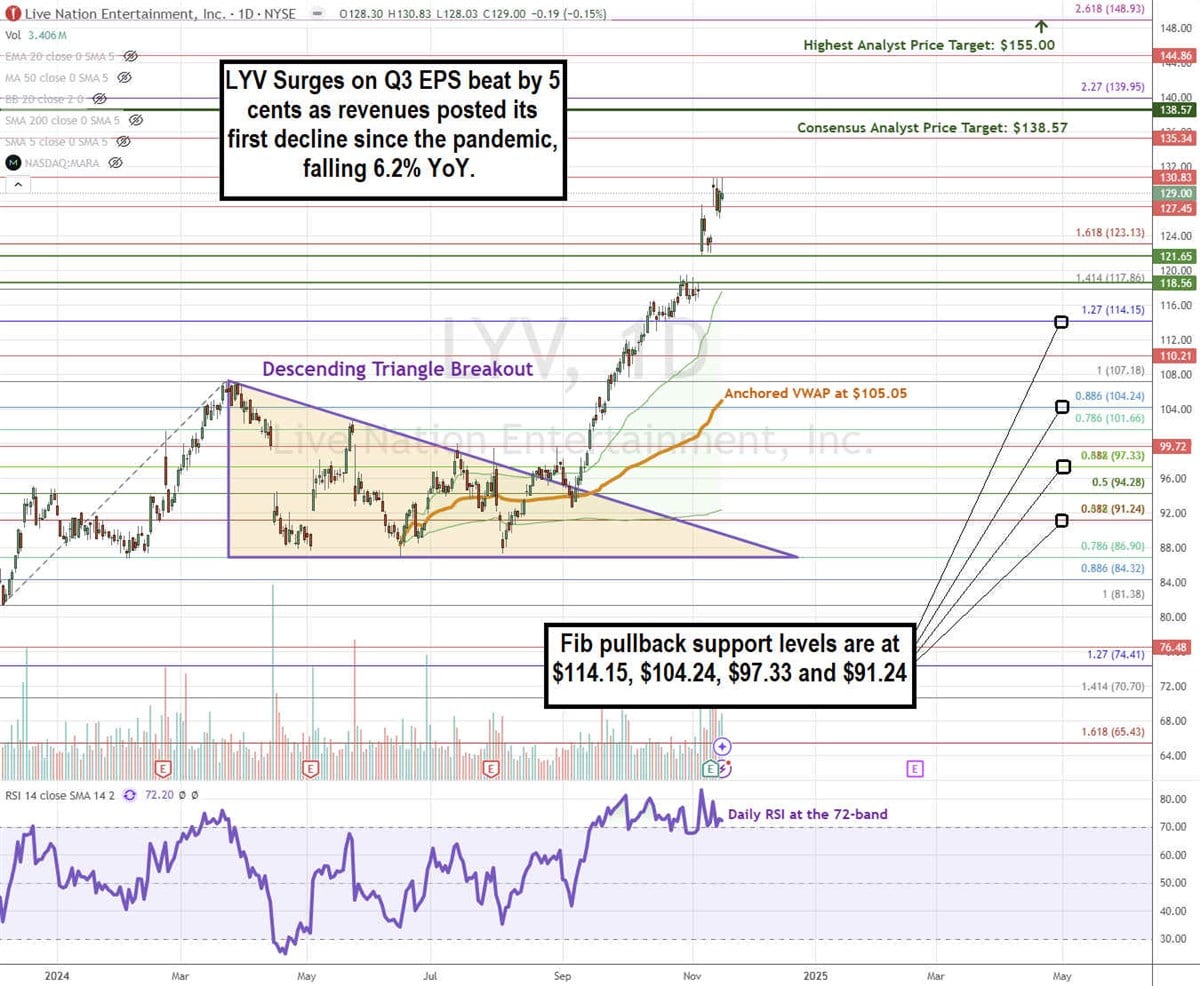
Live Nation Entertainment Inc. LYV is the world's largest live entertainment company, with leading positions in concert promotions, venues, ticketing, artist management, and sponsorship segments. The company is so dominant that it is regularly a defendant against antitrust violations. The latest was filed in May 2024 by the U.S. Department of Justice along with 30 states over its monopolization by its Ticketmaster business. They are seeking "structural relief," which could result in a potential company breakup.
The business services sector company saw its first quarterly YoY revenue decline since the pandemic, falling 6% YoY in its third quarter 2024 earnings report, but the stock continued to rocket higher. With shares trading up 37.8% year-to-date (YTD), declining revenue, and increasing regulatory pressure, investors may be pondering whether it's time to ring the register on Live Nation stock.
Riding the Live Entertainment Trend at Scale
Artists have been transitioning toward live entertainment to generate revenue since the advent of music streaming, which has cut down on royalty income tremendously. To earn minimum wage, artists need at least a million streams per month. On services like Spotify Technology SPOT, artists are paid an average of less than a tenth of a penny per stream. Instead, more and more artists are trying to boost their earnings through merchandise sales and concerts.
Live Nation is a major beneficiary of this tailwind as it controls over 80% of the major concert venues. This includes exclusive arrangements with 265 concert venues, including 60 of the top 100 amphitheaters in the U.S., and a controlling interest in 338 venues worldwide. Over 400 artists are locked into Live Nation management services.
Revenue Misses Q3 Estimates, But the Metrics Are Eye-Watering
Live Nation reported massive metrics in its third quarter of 2024. The company generated $1.66 per share of earnings, beating consensus estimates by 5 cents. The company generated the highest-ever concert profitability, with adjusted operating income rising 39% to $474 million with margins of 7.2%, up over 200 bps YoY. Revenue fell 6.2% YoY to $7.65 billion, missing consensus estimates of $7.75 billion.
Fans' venue spending rose double-digits per fan at major festivals and up 9% YoY at amphitheaters. Sponsorship revenue rose 6% to $390 million. Strategic partners generating over $1 million grew 20%, driving the majority of revenue growth.
Live Nation ended the quarter with $5.5 billion in cash and cash equivalents comprised of $1.6 billion in ticketing client cash, $2.6 billion in event-related deferred revenue, and $1.7 billion in free cash.
Expanding of Venue Nation to Boost Attendance Capacity
Live Nation concert attendance rose 3% YoY to 114 million fans. Arena and amphitheater attendance rose double-digits, more than offsetting the 30% YoY decline in stadium attendance. The company also points out that artists earned an average of 30% more per show when playing the same amphitheaters compared to 2023 and 2022. The company plans to add or refurbish 14 venues through 2025, which is expected to increase capacity by eight million more fans. Capex for 2024 is expected to be around $700 million, with five venues accounting for nearly 45% of the spending.
Live Nation Claims Artists Are Making More in 2024
Live Nation pointed out that the leading indicator forecast continued growth in 2025. The growing concert pipeline in large venues, including stadiums, arenas, and amphitheaters, is expected to grow by double digits. Live Nation has already sold more than 20 million tickets for concerts in 2025, and sponsorship commitments are already up double digits.
Refurbishing to Drive Up Premium and VIP Experiences
Live Nation CEO Michael Rapino commented on how the company is focused on growing its premium VIP experience to super fans. While 2%, 4% and 6% of shows are premium, they want to grow that up to 20% or more, which is driving the refurbishment initiative.
Rapino commented, “So, a lot of the refurbishments we're doing at venues is about taking regular seats and turning them into better experiences for premium experiences at night. So, we think premium experiences are a big underpin to our entire growth forward because it's using the same customer base, but we always sell out of the boxes, sell out of the premium inventory first, and we never have a problem selling that. “
Descending Triangle Breakout
A descending triangle pattern is a bearish chart formation comprised of descending upper trendline resistance representing lower highs converging with flat-bottom lower trendline support at the apex point. A breakdown occurs when the stock falls down through the lower trendline. A breakout and reversal to an uptrend occurs when the stock surges through the upper trendline resistance.

LYV formed a descending triangle pattern after peaking at the $110.21 swing high in March 2024 with a flat-bottom lower trendline support at $86.90. LYV broke out through the upper trendline at $95.20 on Sept. 10, 2024, and continued to surge to $130.83 after its Q3 earnings release. The daily anchored VWAP support is at $105.05. The daily RSI has been chopping above the 70-band since the upside breakout through the upper descending trendline. Fibonacci (Fib) pullback support levels are at $114.15, $104.24, $97.33, and $91.24.
LYV’s average consensus price target is $138.57 implying a 7.4% upside, and its highest analyst price target sits at $155.00. It has 15 analysts' Buy ratings and one Hold rating. The stock has an 8.63% short interest.
Actionable Options Strategies: Bullish options investors can buy LYV stock on a deep pullback using cash-secured puts at the Fib pullback support levels. Investors looking to ring the register can write in-the-money (ITM) covered calls to collect a premium and implement a profit stop if shares sell off further.
The article "Rocking the Charts: Why Live Nation Could Hit New Highs" first appeared on MarketBeat.
© 2024 Benzinga.com. Benzinga does not provide investment advice. All rights reserved.
Comments
Trade confidently with insights and alerts from analyst ratings, free reports and breaking news that affects the stocks you care about.